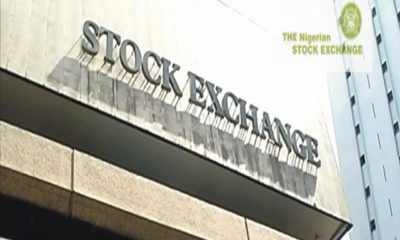- Equities Market Gains 3.9% as Investors Renew Buying Interest
The stock market made an unexpected recovery last week as investors embarked on bargain hunting in stocks perceived to have attractive valuation. After falling 17.8 per cent last year the market had opened the New Year on bearish note due to weak demand for stocks ahead of the general elections. However, some discerning investors decided to take advantage of prices of some stocks that had hit record lows.
Hence, the return of the bulls to the market leading to seven days of gain.
Consequently, the Nigerian Stock Exchange (NSE) All-Share Index (ASI) appreciated 3.9 per cent last week to close at 31,005.17, while market capitalisation ended higher at N11.562 trillion.
Similarly, all other indices finished higher with the exception of the NSE Banking Index that depreciated by 1.04 per cent while the NSE ASeM index closed flat.
The NSE Industrial Goods Index led with 12.7 per cent gain, followed by the NSE Insurance Index with 5.5 per cent, while NSE Consumer Goods Index and NSE Oil & Gas Index went up by 2.7 per cent and 0.59 per cent in that order.
However, commenting on the market performance, analysts at Cordros Capital Limited said: “In spite of this week’s rally, our view continues to favour cautious trading pattern in the equities market amidst brewing political jitters ahead 2019 elections, and the absence of a positive market trigger. However, we the positive macroeconomic fundamentals to drive recovery in the long-term.
Daily Performance
The Chief Executive Officer of the NSE, Mr. Oscar Onyema, had on Monday, explained why the market declined last year. He had said it was the trend globally as most emerging and frontier markets closed weaker. He noted that in Nigeria, the market would remain volatile in the first half (H1) of 2019 before it will recover in second half (H2).
“Accordingly, we anticipate volatility in equities market in H1 in 2019 with enhanced stability post-elections. We believe swift approval and implementation of the 2019 budget may have a positive impact on the companies’ earnings as well as consumer spending. Therefore, we anticipate a return of listings during the year with an uptick in market activity during the H2 of 2019,” Onyema said.
Also, last Tuesday, the market the maintained bullish trend with the NSE ASI rising 0.4 per cent to close at 30,583.21, while market capitalisation added N45.7 billion to close at N11.4 trillion.
The renewed demand has continued to boost prices of stocks. And buying interests in Dangote Cement Plc, Nigerian Breweries Plc among other bellwethers influenced the positive performance on that day.
But Neimeth International Pharmaceuticals Plc led the price gainers’ chart with 9.4 per cent, trailed by NEM Insurance Plc with 9.7 per cent. Sovereign Trust Insurance Plc went up by 9.0 per cent, while Royal Exchange Plc and Jaiz Bank Plc chalked up 8.3 per cent and 8.0 per cent respectively.
PZ Cussons Nigeria Plc, Union Diagnostic & Clinical Services Plc and Wema Bank Plc garnered 7.7 per cent, 7.4 per cent and 5.1 per cent in that order. Cement Company of Northern Nigeria Plc and Forte Oil Plc appreciated by 4.5 per cent and 2.5 per cent respectively.
Conversely, Etranzact Plc led the price losers with 9.8 per cent, trailed by Resort Savings and Loans Plc with 9.6 per cent, just as Cornerstone Insurance Plc shed 9.0 per cent. NPF Microfinance Bank Plc went down by 8.1 per cent, while First Aluminium and AXA Mansard Insurance Plc depreciated by 6.0 per cent and 4.6 per cent in that order.
By Wednesday, the market had recovered N235 billion in three days following gains recorded by bellwether stocks. The market capitalisation rose from N11.124 trillion to N11.329 trillion in three days, while the NSE ASI rose 2.1 per cent from 29,830.70 to close at 30,460.68 in the three days.
However, on Wednesday alone, accounted for 1.07 per cent bolstered by gains in bellwether counters such as Guinness Nigeria Plc, Forte Oil Plc, Dangote Cement Plc and United Bank for Africa Plc among others.
A total of 24 stocks appreciated compared with 16 others that depreciated. Sovereign Trust Insurance Plc and Veritas Kapital Assurance Plc led the price gainers with 10 per cent apiece. Guinness Nigeria Plc followed with 9.6 per cent, just as Honeywell Flour Mills Plc and NEM Insurance Plc chalked up 9.5 per cent each. Custodian Investment Plc added 9.4 per cent just as Niger Insurance Plc, Union Diagnostic and Clinical Services Plc and University Press Plc garnered 9.1 per cent, 8.0 per cent and 5.2 per cent respectively.
UBA was also among the price gainers, rising 2.0 per cent or N0.15 to close at N7.45 per share as investors took position ahead of dividend announcement by the bank. The board of directors of the bank will meet soon to approved its 2018 financial accounts and recommend a final dividend for the year. Having paid an interim dividend for the half year, expectations are high that UBA will give a dividend that is higher than what was paid the previous year.
Beta Glass Plc led the price losers with 10 per cent trailed by Northern Nigerian Flour Mills Plc with 9.2 per cent. Resort Savings and Loans Plc shed 8.8 per cent, while PZ Cussons Nigeria Plc and Neimeth International Pharmaceuticals Plc 8.3 per cent and 4.6 per cent in that order.
Activity level was, however, mixed as volume traded increased 1.9 per cent to 305.8 million shares while value traded declined 35.3 per cent to N2.1 billion. The top traded stocks by volume were Diamond Bank (141.2 million shares), Fidelity Bank Plc (18.6 million shares ) and GTBank (17.4 million shares) while GTBank(N577.7 million), Zenith Bank (N357.1 million) and Diamond Bank (N296.6 million) were the top traded by value.
The stock market appreciated further on Thursday as the bulls consolidated their hold on the market. As a result the NSE ASI appreciated 0.58 per cent to close higher at 30,137.53, while market capitalisation added N64.4 billion to end at N11.2 trillion.
Buying interest in Zenith Bank Plc, Dangote Sugar Refinery Plc and Stanbic IBTC Holdings Plc propelled the positive performance. However, Cement Company of Northern Nigeria Plc led the price gainers with 10 per cent, trailed by Ikeja Hotel Plc with 9.3 per cent. Royal Exchange Plc and C & I Leasing Plc garnered 9.0 per cent apiece. NEM Insurance Plc, AXA Mansard Insurance Plc and United Capital Plc chalked up 8.6 per cent, 8.3 per cent and 8.0 per cent respectively.
Conversely, Newrest ASL Services Plc led the price losers with 9.4 per cent followed by Veritas Kapital Assurance Plc with 9.0 per cent. Neimeth International Pharmaceuticals Plc shed 8.5 per cent, just as First Aluminum Nigeria Plc went down by 8.3 per cent.
Activity level also strengthened as volume and value traded surged 126.7 per cent to 300.1 million shares and 199.2 per cent to N3.2 billion. Diamond Bank (100.7 million shares), GTBank (39.4 million shares ) and UBA (26.2 million shares ) were the top traded stocks by volume, while GTBank(N1.3 billion), Zenith Bank (N463.0 million) and Diamond Bank (N209.4 million) were the top traded by value.


 Naira4 weeks ago
Naira4 weeks ago
 Naira4 weeks ago
Naira4 weeks ago
 Travel4 weeks ago
Travel4 weeks ago
 Jobs4 weeks ago
Jobs4 weeks ago
 Naira4 weeks ago
Naira4 weeks ago
 Naira3 weeks ago
Naira3 weeks ago
 Investment4 weeks ago
Investment4 weeks ago
 Travel4 weeks ago
Travel4 weeks ago

























